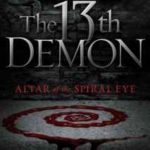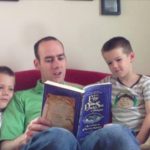Hutchmoot: There and Back Again
 Long ago, C. S. Lewis and J. R. R. Tolkien met regularly with other writers and called themselves “The Inklings”. They met at a pub in Oxford and called their meeting room, the Rabbit Room.
Long ago, C. S. Lewis and J. R. R. Tolkien met regularly with other writers and called themselves “The Inklings”. They met at a pub in Oxford and called their meeting room, the Rabbit Room.
I did not know there were so many authors from the distant past who would, by today’s standards qualify as authors of speculative fiction. I learned more about such writers as C. S. Lewis, J. R. R. Tolkien, Flannery O’Connor, George MacDonald, Wendell Berry, Walter Wangerin, Jr., and Frederick Buechner at Hutchmoot 2010.
Hutchwhat? Whatmoot?
Here is the official description of Hutchmoot from the Rabbit Room website and its proprietor, author/songwriter/singer Andrew Peterson:
I knew that my life had been impacted on a deep spiritual level by the works of artists and writers who were Christians, and from what I could tell those artists and writers were fashioning those works in community.
They not only cared about the excellence of their work, they understood, on some level, that they needed each other. So they met every week in the original Rabbit Room and shared a pint by the fire. They nourished friendships, they celebrated one another’s gifts (and since they were men, and British, I’m sure that means they also made fun of each other), they wagged their jaws, and they shared their writings. They may have even chortled. So, what is a Hutchmoot? It’s a gathering. A meeting. A retreat. A conference. A powwow. A shebang. An entmoot, without the ents.
Interview with A.S. Peterson
To understand the importance of community to authors, particularly those of us on the “fringe” in speculative fiction, I thought I would reach out to this really cool author of “Fiddler’s Gun” and “Fiddler’s Green” (which can be read here), A. S. Peterson, affectionately known as “Pete”. Pete is a co-founder of the Hutchmoot and he agreed to a few questions about Hutchmoot, his writing, and the process that brought this fantastic weekend to life in August, 2010.
Bruce: Why did the contributors to the Rabbit Room decide to hold a conference like Hutchmoot?
Pete: For a couple of years readers kept suggesting that we should put on some kind of conference. Initially we just rolled our eyes. The idea of it seemed preposterous. We didn’t think anyone would come.
But the more we considered it the more we thought we could do something that was unique, and fun, and meaningful. Finally, last year, we decided to give it a go. We’d been talking about creative community for so long in the digital realm that we thought it was time to bring that into the real world—bring the virtual community together in a real place and see what happened.
We wanted to steer clear of becoming just another creative workshop-style event. There are plenty of those and they do a great job. We really wanted to focus on what it meant to create in the context of community. And we also wanted to welcome people who weren’t necessarily creators but were genuine appreciators of the writers, and musicians, and other artists we talk about and look up to.
We still didn’t think anyone would come but, thankfully, we were wrong. We sold out in a couple of weeks and to our surprise the weekend was a huge success. It was great to meet so many folks and spend the weekend with them. The response was so strong that we started planning this year’s Hutchmoot right away. When we announced it in February, it sold out in five hours.
(Bruce: I was in the process of rewriting my second book for Realms and I was hoping to learn some “nuts and bolts” from this conference. I showed up in Nashville and dove right in to Hutchmoot. But, I discovered very quickly, there were no “Nuts & Bolts” to be offered. We had sessions that dealt with authors I mentioned above and Walter Wangerin, Jr. spoke eloquently for almost two hours on the power of Story. That word kept coming up over and over and over. Story. Story. Story. I was reminded of the Clinton era war cry “It’s the economy, stupid!” only the war cry here was “It’s the Story, stupid!” And, after God pounded me over the head with that concept, I got it. It was all about Story. Sure, the nuts and bolts are important. But, if the Story is king, the nuts and bolts will follow. So, I asked Pete about Story.)
Bruce: “The Rabbit Room is a place for stories. For artists who believe in the power of old tales, tales as old as the earth itself, who find hope in them and beauty in the shadows and in the light and in the source of the light.” I love this quote from the Rabbit Room site. How important is story to our walk as Christians?
Pete: I think it’s of incredible importance because we’re living in the middle of the greatest story ever told. When you begin to look at history as a story, especially from a writer’s perspective, I think you gain a new understanding of the mind of God. As a writer you create characters and entire worlds. You set them in motion and you watch as your creation takes on its own life. You see it writhe and struggle and suffer amid the conflict of the tale. Your characters ask why you do these things, why you put them through such awful terrors and you keep writing because you know how the story ends, you know that there’s a reason for everything, that nothing is wasted, that there’s a moment of transformation just a few pages away and it’s going to be worth what it cost to get there.
When you start to think like that about your own creation, you’re peeking into the “mind of the maker” (as Dorothy Sayers would say). We’re all living in the midst of the great epic of creation and without an understanding of Story, we’re missing half the show. I think Marilynne Robinson sums it up beautifully in this passage from Gilead:
I feel sometimes as if I were a child who opens its eyes on the world once and sees amazing things it will never know any names for and then has to close its eyes again. I know this is all mere apparition compared to what awaits us, but it is only lovelier for that. There is a human beauty in it. And I can’t believe that, when we have all been changed and put on incorruptibility, we will forget our fantastic condition of mortality and impermanence, the great bright dream of procreating and perishing that meant the whole world to us. In eternity this world will be Troy, I believe, and all that has passed here will be the epic of the universe, the ballad they sing in the streets. Because I don’t imagine any reality putting this one in the shade entirely, and I think piety forbids me to try.
As important as Story seemed to be at Hutchmoot, equally impressive was the sense of community.
Bruce: How has the community of artists that form the Rabbit Room inspired or encouraged you as a writer and an artist?
Pete: They remind me that I’m not alone. I think every artist struggles with the fear that no one else understands him, that no one knows what it’s like to need to create something meaningful, that no one else feels that holy restlessness. But as tempting as that is to believe, it’s not true. There’s art erupting all around us and community helps us to remember that. For me personally, it not only gives me confidence and reminds me that I’m not crazy, but it drives me to better myself. I don’t want to settle, I don’t want to disappoint the faith that others have in me, so I’m constantly pushed forward.
Bruce: To those authors out there who are struggling with stories from a Christian worldview that are on the “fringe” what advice and/or encouragement can you give them?
I think it’s largely a myth that the market has a bias against Christian works. The shelves are full of great literature by authors with Christian worldviews from Hugo, Tolstoy, and Dickens to Marilynne Robinson, J.K. Rowling, Leif Enger, Wendell Berry, Frederick Buechner, Madeleine L’Engle, Walt Wangerin, Jr., Anne Rice, and dozens of others. You could even build a solid case for folks like Stephen King, and John Irving. So I’m not sure it’s productive to wonder why some things are pushed to the fringe. I think it’s more useful to wonder why other things are pushed to the forefront. The answer is great storytelling built around believable, fallible characters. Concentrate on being the best storywright you can be. Write a great tale and the world will want to read it.
Forget about trying to tell a “Christian” story and just make sure you are telling a good one. If you hone your craft, and tell a story that rings true to people, Christian and non-Christian alike, then it’s going to be a book that people will want to read and tell their friends about. If you concentrate on telling the best story you can, you won’t be able to keep Christ out of it. He’ll show up, he’ll haunt the pages even though you may never see him. Trust that. Rather than looking for ways to use Christ, concentrate on writing the leanest, tightest story you can and trust that Christ can use you.
Questions
 The bad news is Hutchmoot 2011 is sold out. How then can we produce such an extended community? Do you think community, sometimes an overused word, is important to writers? Is it possible we could develop local, physical “hutchmoots” in our own geographical locations to bring together Christian artists in community? If so, how would we do this?
The bad news is Hutchmoot 2011 is sold out. How then can we produce such an extended community? Do you think community, sometimes an overused word, is important to writers? Is it possible we could develop local, physical “hutchmoots” in our own geographical locations to bring together Christian artists in community? If so, how would we do this?
Bruce Hennigan is a practicing radiologist, novelist, dramatist, and apologist living in Shreveport, Louisiana with his wife Sherry. He is the co-author of Conquering Depression and his book series The Chronicles of Jonathan Steel will debut with the novel The 13th Demon: Altar of the Spiral Eye from Realms in October, 2011.











































Thanks for the excellent thoughts about story and community.
Community is important to writers, or maybe “essential” is the word, but the average writers’ conference doesn’t even come close to what you’re doing with the Hutchmoot. Maybe next year…
Quote: “Do you think community, sometimes an overused word, is important to writers?”
Although I’m not a writer it’s obviously important. Even as a reader it’s something I’d like to be involved in. As strange as it sounds I know very few people who actually read books and only one person who reads speculative Christian fiction. It would be nice to be able to discuss all the aspects of what is learned with someone of the same interests. I’ve looked for book clubs but they are all women (which would not please my wife) and the books they read have Amish women on the cover.
Oh well. Viva la Hutchmoot!
Thanks for your excellent comments. Hutchmoot is indeed a rare entity. I talked to Randall Goodgame, one of the singer/songwriters at the Rabbit Room (and he has the most unique Christmas CD for kids — Slugs and Bugs Christmas. Everybody loves the Camel Song!) about being a part of this community. What makes it work for him is the fact that all of the authors, singers, and songwriters live within about 25 miles of each other in Nashville. Unfortunately, those of us who read and write speculative fiction are spread out all over the world. I’d love to have a local “Hutchmoot” but in my area there only about a half dozen Christian authors. So, there you have it. We need to continue to build these virtual communities online and I am very thankful for sites like this one. Keep up the good work guys!
[…] Bruce Hennigan: Thanks for your excellent comments. Hutchmoot is indeed a rare entity. I talked… 3:57 pm, July 9, 2011 […]
[…] from A. S. “Pete” Peterson on Speculative Faith […]